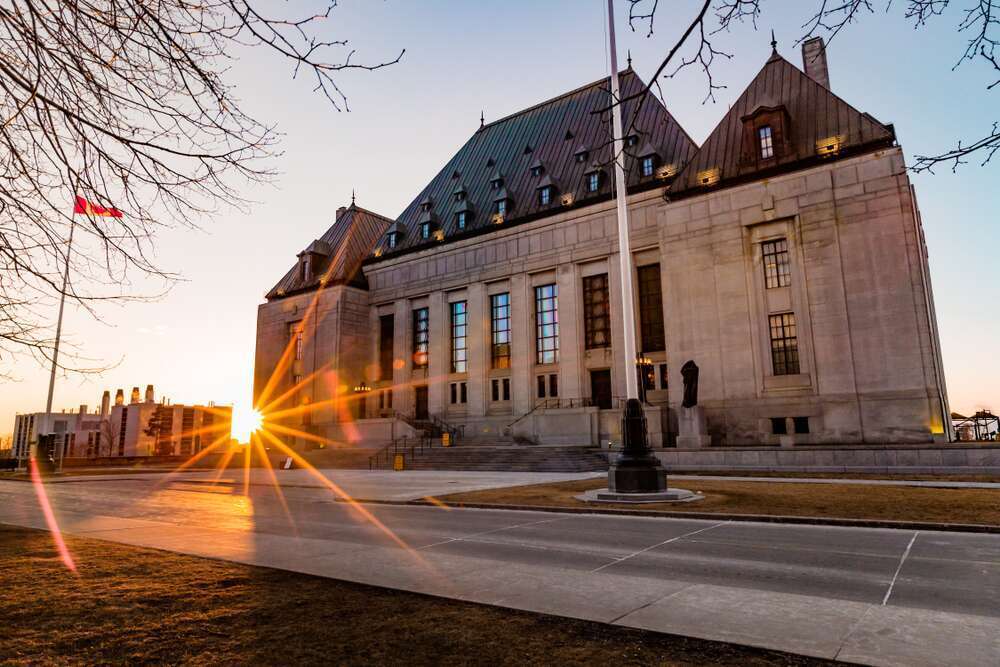The Supreme Court of Canada will decide the proper approach to the interpretation and implementation of the Crown’s promise to increase annuity payments to the Anishinaabe Treaty beneficiaries under the Robinson Huron and Robinson Superior Treaties.
The Robinson Huron & Robinson Superior Treaties
In 1850, the Anishinaabe of the Upper Great Lakes region entered into agreements known as the Robinson Huron and Robinson Superior Treaties with the Crown based on principles of peace, sharing and reciprocity.
As part of the treaties, the Crown promised an annual monetary payment to the Anishinaabe which would be increased over time if resource development in the territories was sufficiently profitable.
Billions of dollars have since been generated from the Treaty territories from forestry, mining, and other resource development.
At the same time, the Anishinaabe Treaty beneficiaries continue to receive the same annual payment of $4 per person that they received in 1875.

The Restoule Treaty Annuities Litigation
The Anishinaabe Treaty beneficiaries brought actions against Canada and Ontario for the Crown’s failure to increase the annuities as promised under the Treaties. The actions are being heard together in three stages.
At stage one, the trial judge confirmed that the Crown has an obligation to increase the annuity payments. The trial judge made this finding in part on the basis of the Anishinaabe perspective on the Treaties, including by considering Anishinaabe law and legal principles underpinning this perspective. At stage two, the trial judge held that Ontario was not entitled to rely on certain technical defences to bar the claims. At stage three, the trial judge will decide the amount of compensation owed as a result of the failure to increase the annuity payments, and how the payments will be calculated going forward.
The stage three trial was completed in September 2023. The decision on stage three has not yet been released.
The Ontario Court of Appeal Decision
Ontario appealed the stage one and stage two decisions to the Ontario Court of Appeal. The decision was released in 2021.
The majority of the Ontario Court of Appeal held that the trial judge correctly interpreted the Treaties, and that the Crown was required to increase its annuity payments to the Anishinaabe Treaty beneficiaries. The Court of Appeal also unanimously upheld the trial judge's decision that Ontario was not entitled to rely on limitations legislation as a defence in the claim.
Ontario appealed the Ontario Court of Appeal’s decision to the Supreme Court of Canada.
Why It’s Important
The Crown’s ongoing failure to uphold and implement its Treaty promises continues to pose a significant barrier to reconciliation for First Nations across the country.
The Restoule appeal will be an opportunity for the Supreme Court to confirm the importance of honouring the Indigenous parties’ laws and perspectives when interpreting the Crown’s Treaty promises, and to affirm that in all cases, the Crown’s Treaty obligations must be honoured and upheld.
First Nations and Indigenous organizations will be intervening at the Supreme Court to provide their perspectives on the issues raised in Restoule and the implications of the Supreme Court’s decision for Indigenous Peoples defending and advancing their rights.
First Peoples Law is honoured to be representing our clients on their interventions in the appeal. Patricia Lawrence will be appearing on behalf of Anishinabek Nation and Bruce McIvor will be appearing on behalf of Teme-Augama Anishnabai and Temagami First Nation.
The hearing will take place November 7 to 8 starting at 9:30 am ET. You can watch the hearing live on the Court's website here.
First Peoples Law LLP is a law firm dedicated to defending and advancing the rights of Indigenous Peoples. We work exclusively with Indigenous Peoples to defend their inherent and constitutionally protected title, rights and Treaty rights, uphold their Indigenous laws and governance and ensure economic prosperity for their current and future generations.
For more First Peoples Law analysis, visit our blog
Sign up for our First Peoples Law Report
Kate Gunn is partner at First Peoples Law LLP. Kate completed her Master's of Law at the University of British Columbia. Her most recent academic essay, "Agreeing to Share: Treaty 3, History & the Courts," was published in the UBC Law Review.
Contact Kate and connect with her on LinkedIn and Twitter
Cody O'Neil is a lawyer at First Peoples Law LLP.
Contact Cody and connect with him on LinkedIn
